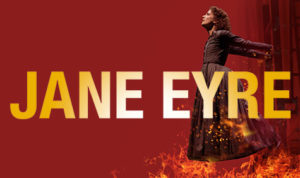
 (5 / 5)
(5 / 5)
Jane Eyre is fearsome and blazing, with an inevitably symbolic of the plays presentation of temptation and restless desire, the audience succumb, engulfed by the ferocity of its cast and the boldness of Sally Cookson’s direction.
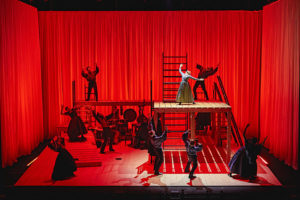
Amongst the haunting moors, trepidation is a state of being and, yet, our female heroine embodies its antithesis – fired by generational anguish, past and contemporary, Bronte – mediated by Cookson – defies the societal dismissal of the wholly feminine nature of yearning and discontent. The National Theatre’s ‘Jane Eyre’ is soaring and liberated, necessary as an, ever-contemporary, evolved feminist narrative.
Hope, within the play, is almost embodied as a metaphorical rejection of the play’s desolate and dire setting, in its weighted suppression, through the stark opposition of the cast’s spirited elevation and weightlessness. Through Jane’s experiences of; the people she meets, the places she sees, and that which she cannot understand, she is subjected to sinisterism and character-dimming corruption – preaching a passive dignity, in favour of her (societally embedded) feminine duty – yet, ultimately love is professed as the only true salvation. Conflicting, in nature, as she is bound through desire, love liberates Jane as simultaneously she is chained to one man for all eternity. Ultimately pre-occupied by the pondering of existentially-defying love, I do wonder how the Bronte’s would respond to Love Island.
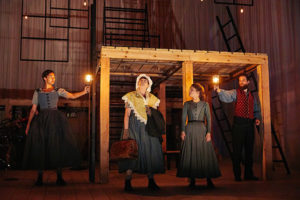
The solidity and grounding conveyed by the set band embodied an inevitability of Jane and Mr Rochester’s unity through an unbridled and innate devotion conveyed by the all-encompassing folk instrumental. Originated within, what was considered, the English ‘country’, in its expression of working-class tradition, custom and superstitions, it is mystifying and fiercely optimistic in wanderlust.
Michael Vale’s set design, earthy and raw, preaches and idolises childlike innocence, as the cast boundlessly throw and exert themselves to-and-fro the minimalistic tree house. In the pure and sanctified white sheets hanging to enmesh the space it is the projection of our own thoughts, the play’s narration and the immorality of the characters themselves which taint and stain the clean, preserved walls of the godly, proper, Victorian society that they abide to.
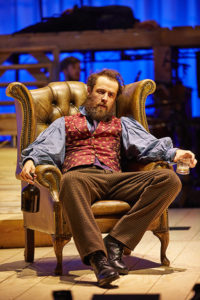
Dan Canham’s movement spurred and propelled its cast with agitation, injected spirit, yet, ultimately, underlined an active mistreatment and suppression of Jane Eyre. The production’s movement and instrumental accompaniment evoked and transpired a wanderlust and disquietude from Jane unto us as the continuous action pounding from the stage beat within my stomach.
The production’s frenetic energy combined with the haunting spectre of Melanie Marshall’s Bertha Mason, a raw, wretched and pitiful operatic presence, magnified the sparsity of the set, with its bare isolation that, arguably, embodies the desolate origins that drew, boundlessly, the souls of Jane and Mr. Rochester to clasp together.
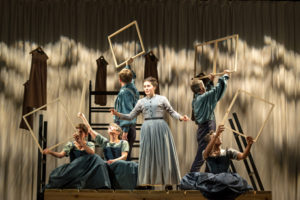
The halting, sharp scenes and the multitudinous use of rough sound gave the play the same raw emotion that categorises the book as such an elegant and unflinching exploration of the human heart. In the flurry, and succession, of such striking performances, the cast achieve flawlessness in their execution of truly turbulent multi-rolling with a rejoiced creative ferment.
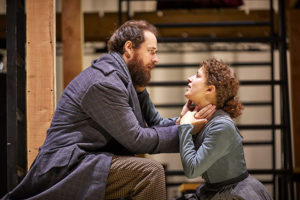
Nadia Clifford was a spectacle to behold brimming with the fever of Jane’s restlessness. Feisty and crumbling, neither over-bearing, Nadia created the unrelenting independence and the secret longing that characterises the eponymous heroine. Nadia’s portrayal allowed Jane to be flawed, multi-faceted in her complexity, to the extent, at which, exposing Mr Rochester as a truly rigid and canvased enigma of a man. Devastated and defeated, yet hopeful and triumphant, in equal measure, the National Theatre’s ‘Jane Eyre’ was stunning, shocking and soaring.
Category Archives: Theatre
Chippy And Scratch by Emily Garside

On Tuesday 27th June, on a fittingly wet night in London a group of Welsh writers, directors and actors gathered to share a host of Welsh work.
Chippy Lane Productions (set up by Rebecca Hammond in 2016) was hosting it’s second Chippy and Scratch night in which 8 playwrights had been selected to share short pieces or extracts from longer works. All performed by Welsh or Wales based actors, and directed by Welsh/Wales based talent.

It’s a great idea, one that brings the Welsh trained/born talent of London and beyond together, and gives those living back in Wales a place they can gather and share work outside of Wales. We know we create great work, create great talent in Wales, and that we have a great community here. But it’s also important to facilitate sharing that with the wider world, and allowing those based elsewhere to feel a part of that community.
I was joining in as a writer. My piece ‘Party Like it’s 1985’ is an extract from a longer piece and something I’ve both wanted to and put off writing for a long time. It wasn’t written specifically to share on this night. In fact, I finally put pen to paper in a fit of rage to submit to another company just to prove a point that they would never, ever select my work. I was right. They didn’t. Herein lies lesson number one in writing: don’t give up. Lesson number 2: not everyone will like you but someone will. Lesson number 3: sometimes a bit of rage will do you good.
So, I was thrilled to be accepted into the scratch night and have the opportunity to both hear the work aloud and to get to collaborate with a fantastic team who have proved so important already to developing the work further. Director Luke Hereford, whose other work I’d seen late last year, shares a great many of my theatrical tastes, and both respects and shares my passion for the subject matter. Writing an LGBT piece, as an LGBT writer, and having a director who without asking gets the importance and sensitivity of what you’re trying to convey is a dream- particularly for scratch night and so early in the overall process of developing my play as a whole. The cast assembled were also an utter dream. The marvellous Delme Thomas whose other performance I’d seen and greatly admired, along with Toby Vaughn and Melissa Bayern made up the fantastic team that brought to life my little piece.
For my own work then the process of being involved was as important-if not more so- than the night itself. Hearing the work was fantastic, and as a writer sparked off a whole series of reactions and associations in my brain that I now can’t wait to put into action. As ever the actors discovered things and surprised me and gave me a whole array of new interpretations on my own work. As well as the equally important knowledge of what doesn’t work, or what could work better. And that should be the core of a scratch night- for everyone creatively to experiment, grow their work and learn from each other. In that respect for me that was a great success.
The other important element of a scratch night is the opportunity to see so many different writers in one evening. So, for this we had: Chris Harris, Kevin Jones, Neil Bebber, Melanie Stevens, Jacob Hodgkinson, Ruth Majeed and Poppy Corbett. Such an array of styles of writing, from one person pieces to ensembles, laugh out loud funny to reflective. That there were a range of experienced writers and newer artists was also significant, feeling like there really is a chance for everyone to be involved. And significantly, a 50:50 split between male and female writers- a balance that we certainly don’t see elsewhere.
There isn’t time to do justice to everyone involved. From the funny surreal piece by Melanie Stevens with ‘When Opportunity knocks’ (and excellent Hagrid impression involved in the performance). To love stories with a twist from Chris Harris in ‘Love you in a single Brain cell’, to the intriguing world Jacob Hodgkinson painted in ‘DIBYNAIAETH’ There was a real array of approaches and styles on show.
Four pieces are going to be seen again at Chapter in Cardiff on the 18th of July, giving the writers a chance to develop the work further. Kevin Jones the winner of the night with ‘Cardiff Boy’ will be joined by Neil Bebber’s ‘Tiny Mad Animals’ Poppy Corbett’s ‘You Gotta go there to come back’ and Ruth Majeed’s ‘Outside Blisters’. From Corbett’s hilarious but touching tale of moving from Wales to the big city, to Majeed’s hilarious account of a night out at a Valley’s nightclub, to the 90s backdrop of Jones’ monologue and the quietly touching piece by Bebber these pieces show a great snapshot of the wider talent on display.
As well as showcasing the writing, and the talent of the performers and directors involved, what the night also offered was a chance to yes, network, but also community build. Those conversations in the bar afterwards will hopefully lead to more collaborations both in London and back home in Wales. As a writer however, the most valuable thing I could have was to get to work with a my team and see what I’d done brought to life. Seeing those 10 minutes of it was great, but it’s the before- the preparation and what that offered- and the after, and where it leads that is the real opportunity for writers to seize onto. So thanks to Chippy Lane for giving me and my slightly oddball, but hopefully interesting piece a chance and I can’t wait to see where it, and everyone else’s work goes next….(after the whole team goes to the Chippy of course!)
http://www.londonwelsh.org/chippy-scratch-night/
Review Shirley Valentine by Jane Bissett

Shirley Valentine is a middle-aged housewife who talks to the wall. She is married to Joe and has been a faithful wife and mother. Stuck in the rut of an unfulfilled marriage of routine and domestic drudgery she longs for another life.
Shirley’s best friend Jane, who is unattached since she discovering her husband in bed with the milkman, seems to enjoy a carefree existence and is able to experience a world that Shirley can only dream about.
This however, changes when Jane books a holiday to Greece and not only invites Shirley but gives her the tickets so as to make her decision more difficult.
Of course Shirley wants to go but how does she tell Joe, a man who for the whole of their married life has considered their annual holiday to the Isle of Wight – abroad.
Whilst the holiday is only three weeks away, Shirley struggles with her desire to change her life and become Shirley Valentine once more and leave drudgery behind. As a wife and mother she is caught up in being the constant in the lives of her family and wonders if she should go at all.
Eventually, she decides that she cannot let this opportunity slip away, whilst also knowing that if she tells Joe he will throw a fit, talk her out of it and tell her how stupid she is being.
So confiding in the kitchen wall, to whom she constantly chats, she plans to accompany Jane to Greece.
With all her domestic plans in place, Joe’s meals cooked and in the freezer, her mother coming over to defrost and microwave for him, Shirley buys new clothes for the new her that will go to Greece.
On the day of departure Shirley leaves by taxi and her adventure begins.
Once in Greece Jane hooks up with a man and Shirley spends the first few days by herself. She enjoys the freedom of not being at the beck and call of anyone else and she spends her days exploring the island and soaking up the sun and culture and slowly but surely a new Shirley is reborn – Shirley Valentine of her youth has returned.
With the scales peeled from her eyes she sees the people around her in a new light. The holiday makers at her hotel and the local population, Shirley has gone ‘native’.
Her transformation is complete when she meets Costas, the owner of a local tavern, who helps her fulfill her dream of drinking wine by the sea in the country where the grapes are grown.
Promising not to take advantage of her, the following day he takes her out for the day around the islands in his brother’s boat. The experience is life changing for Shirley, bolstering her confidence in herself and her attractiveness.
On the day of departure, as they are stood in the airport check-in queue Shirley realises she cannot go back to her old life and with the shouts of Jane and fellow passengers following her “come back!” she walks out of the airport and away from her old life and into a new one as she decides to stay in Greece and ask Costas for a job.
When she gets to the tavern Costas is already ‘chatting up’ the next woman, but Shirley hasn’t come back for Costas she has gone back for herself, the youthful, carefree, adventurer who was buried deep inside and who has finally emerged.
Now working evenings at the tavern, Shirley has fielded several phone calls from Joe demanding that she come home. Now, he has decided that his only course of action is to go to Greece to bring her back. Shirley on the other hand has no intention of returning and is sure that Joe will pass her by before recognising her as the happy changed woman she has become.
Shirley Valentine is the creation of writer Willy Russell. She is a manifestation of the 1960/70s middle-aged woman who married young, brought up a family and supported her husband.
Playwright Willy Russell was brought up in Liverpool surrounded by a family of strong women. At the age of 15 he left school to work at a womens’ hairdressers before returning to education and his career as a writer. It is clear that his observations of the women that surrounded him have had an effect on his writing as he has captured their essence as well as the secret dreams and aspirations of women of this time perfectly.
As a one-woman play Shirley Valentine is a triumph of female characterisation. As Shirley, Jodie Prenger skilfully develops her personality as the play unfolds and she tells her story. As she works her way around the kitchen and talks to the audience and of course the ‘wall’ you are drawn into her world and even the younger theatre goer gains a greater understanding of the life she leads and the life she dreams of.
It did feel as if it was a little bit of a slow burn, but this character could not have been rushed as she bared her soul and inner dreams before us.
Prenger’s portrayal of Shirley was a realistic and believable one. The audience was biased towards women, it has to be said of a certain age, who were empathetic to the character and her situation. The unsuppressed laughter at Shirley’s description of her life and encounters was encouraging as you realised that the audience ‘got it’.
Glen Walford has directed this production with the imagination and skill that you would have expected given her directing pedigree.
Although there are only two scene locations both felt familiar. The kitchen, the heart of the home, and the beach in Greece. I particularly liked the subtle lighting effects that gave movement to the sea it added to the atmosphere without distracting.
If there is one take away moment it has to be watching Prenger actually cooking chips’n’egg on stage, and as the lights dimmed for the next scene I couldn’t help smiling to myself as a male stage hand came on to clean the kitchen area. Something that her Joe would have been horrified at seeing, but then I wondered, would any of the younger women in the audience have even noticed?
Prenger did not disappoint as Shirley and received a well deserved standing ovation for giving us two hours of sheer pleasure.
Shirley Valentine plays at Cardiff’s New Theatre from;
Tuesday 27 June – Saturday 1 July at 7.30pm
On Wednesday, Thursday and Saturday there are performances at 2.30pm.
For further details about the show or to book tickets call the Box Office on 02920878889.
Top Tunes with Emily Garside

Hi Emily great to meet you, can you give our readers some background information on yourself please?
I’m a writer and researcher with a love for theatre. Having been an academic for several years while writing my PhD I’m now getting back to writing my own plays again too. Born and raised in Cardiff I came back after time in London and Canada and Nottingham and I love being home. I’m a first class nerd, which I take as an absolute compliment. My first theatrical love was musical theatre as I’m sure my music choices show!
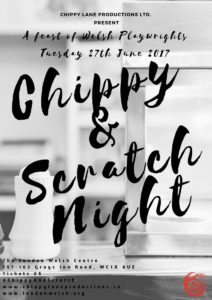 I’ve recently written for Dirty Protest in their “Election Night” event as well as had pieces on at the Southwark Playhouse. My most recent work “Party Like it’s 1985” is being performed as part of Chippy Lane Productions 2017 scratch night on June 27th.
I’ve recently written for Dirty Protest in their “Election Night” event as well as had pieces on at the Southwark Playhouse. My most recent work “Party Like it’s 1985” is being performed as part of Chippy Lane Productions 2017 scratch night on June 27th.
This chat is specifically about music and the role it has played in your personal and professional life. Firstly to start off what are you currently listening to?
We are interviewing a range of people about their own musical inspiration, can you list 5 records/albums which have a personal resonance to you and why?
1
2
This chat is specifically about music and the role it has played in your personal and professional life. Firstly to start off what are you currently listening to?
Currently listening to; The Groundhog Day musical cast recording. Written by Tim Minchin it’s quite simply one of the best new musicals I’ve seen in the last 10 years. It’s also witty and catchy while also being a really quite emotional listen.
We are interviewing a range of people about their own musical inspiration, can you list 5 records/albums which have a personal resonance to you and why?
Rent- Original Broadway Cast Recording. Quite simply I wouldn’t be who I am personally or professionally without this album. At 19 like many a musical theatre kid, I discovered Rent. I fell in love with the music and my love of that musical shaped my theatre-going life. It also shaped my professional life. From writing first my undergraduate dissertation on the musical, to Rent being a key part of what became my PhD. The music, and composer Jonathan Larson himself are some of the greatest influences on me. Personally, it was a gateway to so many things, including friends. One of my closest friends lives on the other side of the world, but we’re friends because of Rent. Last year we both stood on stage in a Broadway theatre with one of the original cast from Rent. This girl from Cardiff, who never was part of the theatre world, getting to stand on stage on Broadway, with a friend I’d never have, from the other side of the world, having written a PhD on something this actors was in, all because of this music. So Rent is pretty special to me.
Sister Act-Soundtrack. Choirs have played a big part in my life since I went to University, both giving me a creative outlet and allowing me to make some great friends and have some amazing experiences. Coincidentally both choirs I’ve been in over the last 10 years or so have taken the music of Sister Act as an inspiration. I think the message of the films, about the power of music and friendship has been integral to what makes my current choir so special, so the music of these films will always be special to me. (And in a couple of weeks I get to do my best impression of ‘little redhead Nun’ which my singing teacher always used to say was me- looks small and quiet but makes a lot of noise when pushed)
Company- Stephen Sondheim (2006 Broadway Cast recording). Because musicals have ended up a part of my professional life, and even if they weren’t forensic analysis of them is part of my personality as a fan, I can’t leave out a Sondheim musical from this list. Company I’ve chosen because firstly it’s one that in a lifetime of analysis I’d still find new things to uncover and talk about. Added to this, as I grow older and ‘grow into’ the story of Company it becomes more relatable and more emotional. The 2006 production, and recording and the combination of Raul Esparza’s Bobby- I find it hard to imagine any better interpretation of the role- and John Doyle’s re-imagining of the piece- for me will probably always remain the benchmark for this musical. It’s a rare and wonderful thing to have a recording that challenges you intellectually still but also has an emotional resonance that keeps growing.
Sarah McLachlan- Mirrorball. We all have an album that shaped our teenage years and this was mine. I was never cool enough to rebel and be a rocker, so some soft indie-rock was where I ended up. This album just sounds like being 18 again to me.
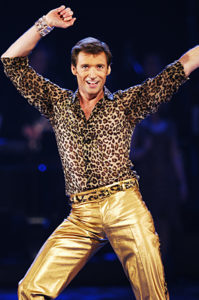 The Boy From Oz- Cast Recording. Even though I rarely listen to it any more this musical was a big part of my life when I first got it. The first musical I ever saw ‘live’ and part of the path that took me to being both a theatre lover and to my professional career as a researcher. It was my gateway to a world of theatre and musicals, and still remains one of the best theatrical memories I have- discovering musicals with my Mum who is still by my side for a lot of theatre. And it’s a musical that has ‘Wolverine’ (Hugh Jackman) dancing and singing in Hawaiian shirts and gold lame trousers- a guaranteed smile to the face memory!
The Boy From Oz- Cast Recording. Even though I rarely listen to it any more this musical was a big part of my life when I first got it. The first musical I ever saw ‘live’ and part of the path that took me to being both a theatre lover and to my professional career as a researcher. It was my gateway to a world of theatre and musicals, and still remains one of the best theatrical memories I have- discovering musicals with my Mum who is still by my side for a lot of theatre. And it’s a musical that has ‘Wolverine’ (Hugh Jackman) dancing and singing in Hawaiian shirts and gold lame trousers- a guaranteed smile to the face memory!
Of these my ‘One track’ would be ‘Will I?’ from Rent. Not the most famous, or even perhaps the best piece on the recording. But for me it was both the moment I fell in love with the piece, the most emotional moment (actually in theatre ever) seeing it live, and my benchmark for a good production. Hearing that track takes me back to a time and place but also always reminds me a bit of who I am, what inspires me and why I do what I do.
Review The Graduate New Theatre Cardiff by Eloise Stingemore

 (3 / 5)
(3 / 5)
The hit West End comedy with its unforgettable characters from the landmark novel and Oscar-winning film are brought to life on the stage of Cardiff’s, New Theatre.
Based on the novel by Charles Webb and the 1968 film, it concerns Mrs Robinson’s played by Catherine McCormack, seduction of young middle class rebel without a cause character Benjamin Braddock, played by Jack Monaghan. Who is struggling to come to terms with his future, worrying that his family expect too much from him, and feels thoroughly disillusioned. However, when seduced by long-term family friend the sensational Mrs Robinson his boredom takes a new direction. And when he has a date with Mrs Robinson’s daughter Elaine, he finally finds some meaning to his life, a meaning that Mrs Robinson opposes!
There is no denying that since it was first written and later immortalised on the big screen the world has drastically changed, which is reflected both in Terry Jonson’s adaptation and Lucy Bailey’s direction of the story for the stage. In no way does it shy away from the prejudices of that time, and in doing so gives the audience a sense of progress that we as a society have made in regards to sexism. Yet at the same time it gives you pause for thought in relation to how little progress we’ve made in some areas too – especially our ability to communicate with those around us. This theme in the play gives a great sense of amusement and laughter for the audience, especially when touching on the idea of a ‘generation gap’ in scenes between Ben and his Dad. As well as a much-needed sense of relevance, as we now live in a world where such dalliances have become the norm albeit not always outwardly accepted by those around us. Yet the idea that young people see a different future to their parents, but struggle to communicate that future, is still very much relevant albeit not as new as it was in the 60s.
However, to pull off Charles Webb’s original novel, which is a thing of beauty, takes a cast of supreme talent to pull it off. Unfortunately on this occasion, Bailey has failed to assemble such a cast; there was a lack of chemistry between the two leads and the attempt to bring emotional ballast to the piece in the second half by bulking up the role of Mrs Robinson’s daughter, Elaine, played by Emma Curtis. Turned The Graduate from being a dark, funny and beautiful satire of suburbia into a thin story about a kid who feels unsatisfied with his life, chucks his chances away and emerges relatively unscathed at the end.
Review The Graduate, New Theatre, Cardiff by Jane Bissett
The stage production of The Graduate is Terry Johnson’s adaptation of the 1967 screenplay for the film of the same name. The story of the Graduate was written by Charles Webb and was his first novel written at the age of 24. Whilst it is not considered directly autobiographical, Webb’s own life is very much reflected in what he wrote and he has drawn on his own experiences to portray the, what was then, young Benjamin Braddock.
The play, set at the time it was written, gives us an insight into the world of the 1960s up and coming affluent American families and their aspirations for their offspring.
In contrast Benjamin shows us a confused young man who having graduated is unclear of his route ahead. His parents want him to follow a career path that will lead him to a secure future both financially and socially, however, Benjamin does not view this life with such optimism.
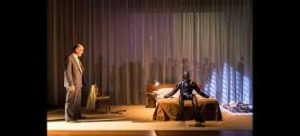
On the day of his graduation party he is propositioned by a friend of his parents, Mrs Robinson, a woman clearly bored in an unfulfilled marriage that denied her of a career and life before her life as a mother and housewife began and has an unhealthy relationship with alcohol. Shocked and knowing the close relationship between his parents and the Robinson’s he rejects her. Curious, bored and wanting to experience life Benjamin later begins an illicit affair with Mrs Robinson that lasts the summer. However, he quickly realises that he wants more from life and from a relationship.
Behind the scenes Mr Robinson and Benjamin’s father have been matchmaking and have arranged for him to take the Robinson’s daughter, Elaine, on a date. Disinterested Benjamin takes her to a venue that he is certain she will not like and he isn’t disappointed. Benjamin and Elaine continue to date much to the disapproval of her mother, his former lover, and when Elaine finally returns to college Benjamin announces to his parents that Elaine Robinson is the woman he will marry.
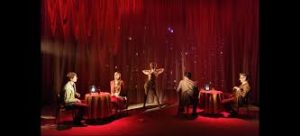
Benjamin then pursues Elaine, declares his love, only to be brought home by his father after the discovery of his affair with Mrs Robinson. As far as his parents are concerned his issues stem from his childhood and as a family they go to see a therapist.
The discovery that Elaine is to marry spurs Benjamin into action and his timely arrival at the church stops the wedding…. does it have a happy ending? Only time will tell but Benjamin and Elaine do end the play by running away together.
In Webb’s life his college romance with Eve Rudd (aka Fred) faced disapproval from her parents and despite numerous barriers put before them it went on to be a lifelong relationship that endured the tests of time and that of family life as they had two sons.
This production was set at the time it was written and had a very retro feel to the set design and the way in which the scenes changed. There were some up-to-date touches with dream sequences being projected as a film in the background which I felt visually worked well.
Jack Monaghan’s portrayal of Benjamin Braddock was very reminiscent of that given by Dustin Hoffman in the 1967 film of The Graduate. His slow American accent accentuated the personality of Benjamin and indeed allowed us to consider his age and thought processing of the situations that he found himself in. Whilst in 2017 a young man of 21 is worldly wise we have to remember that this was certainly not the case in the families of the new up and coming affluent classes of American society of the 1960s.
From the moment Catherine McCormack (Mrs Robinson) sets foot on the stage we see a bored middle aged woman who is desperately trying to cling on to her youth. Her marriage is unfulfilling and she has taken refuge in alcohol a poor excuse, even then, for her behaviour. As the story unfolds we see a woman who has lost control of her family and resents her daughter for having all the advantages she did not but who does not have the personality and enthusiasm for life that she considers young women of the liberated 1960 should have.
All the cast members enhanced the main characters and gave credible performances in their own right. It was a thought provoking and enjoyable production and never before have I seen a bed with so much stage presence and a the ability to move seamlessly between scenes.
The Graduate needs to be viewed in context to its time and place in history. From conversations around me, many of the audience had seen the film and clearly were enjoying this performance, the only thing that was missing was a Greyhound Bus.
The Graduate plays at Cardiff’s New Theatre from;
Tuesday 20 June – Saturday 24 June at 7.30pm
On Wednesday, Thursday and Saturday there are performances at 2.30pm.
For further details about the show or to book tickets call the Box Office on 02920878889.
http://www.newtheatrecardiff.co.uk/what’s-on/the-graduate/
Top Tunes with Matthew Bulgo
Photographs of Matthew by Jon Pountney
Hi Matthew great to meet you, can you give our readers some background information on yourself please?
Hello! I’m Matthew Bulgo. I’m an actor, playwright and dramaturg based in Cardiff and I’m also an Associate Director of Dirty Protest, Wales’ guerrilla new writing theatre company. I grew up in Swansea, studied in London and stayed there for a chunk of time before settling in Cardiff.
This chat is specifically about music and the role it has played in your personal and professional life. Firstly to start off what are you currently listening to?
I’ve been a huge music fan ever since I hijacked my father’s vinyl collection when I was about 10. I listen to a lot of music. I listen to music when I work, when I’m making food, when I’m having an unwind, when I go running. It’s a really important part of my life. Currently, I’m listening to Hippo Campus, Froth, Ezra Furman, Angel Olsen, Yeasayer, Darwin Deez, Real Estate, Dick Diver, Lord Huron, Will Butler, Maximo Park, Hinds, Rolling Blackouts Coastal Fever, Soccer Mommy, Public Access TV…I’ve also rediscovered Blondie this week so I’ve been binge listening their entire back-catalogue at the moment.
We are interviewing a range of people about their own musical inspiration, can you list 5 records/albums which have a personal resonance to you and why?
The Strokes – ‘Is This It?’ – I love the energy of this album. Once you get past the first track, it feels like a runaway train that’s threatening to derail itself. It just has this real sense of abandon. It’s up there for me as a modern classic. There’s not a single dud track on there.
Arcade Fire – ‘Funeral’ – Now, I’m not a fan of dancing but there are a few tracks on here that are just so galvanising that I just can’t help myself. Again, like The Strokes, this album has this really boundless energy.
The Beatles – ‘Abbey Road’ – This was the first ever vinyl that I bought with my own money when I was about 10. I think my dad had pretty much every other album by The Beatles but this one was missing from the collection. ‘Come Together’ was an immediate favourite, just such a cool riff.
https://youtu.be/_HONxwhwmgU
When I started my first band when I was about 16, that song was top of the set-list. And then there’s the extraordinary B-side to the side to the album where all of the songs segue into each other. As you get to those final few tracks, you can sorta hear that it’s the last thing these four people are going to record together. They’re saying “this is it, and now we’re going to go out with something really spectacular”.
https://youtu.be/KDz5wVc-4QI
Belle and Sebastian – ‘If You’re Feeling Sinister’ – Now, this album reminds me of a really specific time in my life. I was into the music that no-one else really liked and I didn’t dress how people expected me to dress. I started to going to this club night in Swansea that played all the music I loved and I suddenly discovered all the outsiders who were into the same things as me. It was just as this album came out, so these songs felt like the soundtrack to that whole period.
https://youtu.be/P3muLnU-Oko
The Smiths – ‘The Smiths’ – The Smiths are lyrically just exquisite. I loved how they were able to be cool and witty and pithy and fey all at the same time. I could have picked any of their albums really but this has one of my favourites, ‘Still Ill’ on it.
Just to put you on the spot could you choose one track from the five listed above and tell us why you have chosen this?
Ooo, maybe ‘Last Night’ by The Strokes. Great song, super-cool video and a melody that is best shouted rather than sung.
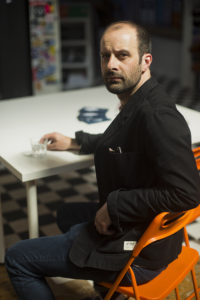
You can purchase a range of the latest vinyl records and classics from Outpost Coffee and Vinyl Cardiff.
http://www.outpostrecords.co.uk
Many thanks for your time Matthew
Review Not Dead Enough, New Theatre, Cardiff by Barbara Michaels
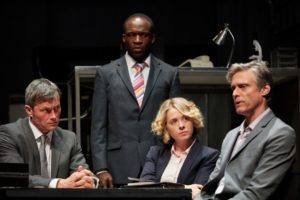
 (2 / 5)
(2 / 5)
Aficionados of the crime novels of multi-award winning playwright Peter James and their central character, Detective Superintendent Roy Grace, will no doubt have been thrilled (forgive the pun) to discover that another of James’ books – the third in the series – has been adapted for the stage. In Not Dead Enough, DS Grace has still not come to terms with the unexplained disappearance of his wife ten years ago. The DS’s present relationship comes to the fore in a complex murder case with the main suspect claiming to have been sixty miles away when he murdered his wife – despite the fact that all the clues add up. Intriguing, eh?
Unfortunately, there is a caveat. What promises to be a gripping evening’s entertainment is a slow burner with a lack of pace that does not bode well; the wait for the kettle to boil seems interminable. Director Ian Talbot does his best, but this world premiere production, adapted for the stage by Shaun McKenna, whose adaptations of James’ previous two crime novels worked so well, fails to get going until almost the end of Act I. It is difficult not to become bogged down in a surfeit of minutiae, most of which ignore the sound advice of “show not tell.” Do we really need quite so much technical info as to what goes on behind the scenes in police investigation of murder? (Murders, actually – there is more than one.).
After a three year run in ITV’s Emmerdale, Bill Ward stars as the dishy DS, focussing on the man rather than the senior police officer. This is all very well, but at times it can make one feel irritated. When he does manage to keep his mind on the job, Ward’s Grace could be more emphatic. Opposite him, television presenter Laura Whitmore makes her professional theatrical debut as Cleo, Grace’s amore, who spends her working hours in charge of the mortuary and her off-duty time with Grace – when he is not off seeking the solution of the wife whose disappearance is still a mystery. Stephen Billington is suitably outraged as Brian Bishop, the chief murder suspect but could give a more sympathetic performance.
The action moves between Brighton and Hove police station and the mortuary. For those of a macabre taste, the latter setting may have added an enjoyable chill to the proceedings, but might have worked better if designer Michael Holt had been given the go ahead to design two separate sets rather than the split set used, with front of stage as the former with the freezers and cold rooms of the mortuary at the rear. Lighting designer Jason Taylor comes to the rescue to some extent with lighting that chills in all the right places.
The DS Grace crime novels are deservedly best sellers and the previous two books adapted well for the stage. Their popularity almost filled the theatre on opening night in Cardiff with an audience already on the edge of their seats with anticipation. Muted applause at the end was a reflection of the feeling that what works on the page doesn’t always cut the mustard on stage.
Runs until Saturday 24 June at the New Theatre Cardiff.
Review Not Dead Enough, New Theatre Cardiff by Jane Bissett
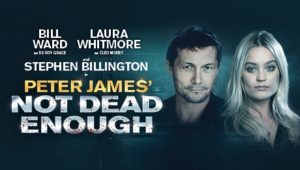
 (5 / 5)
(5 / 5)
NOT DEAD ENOUGH
Review by Third Act Critic, Jane Bissett
NOT DEAD ENOUGH – if ever there was a understatement for a title of a play this is it. This adaptation, although from a book of the same title, was a very much alive, fast moving drama which moved at a pace that ensured the audience was running alongside, wanting more but never left behind.
Peter James is an acclaimed author of crime fiction and Not Dead Enough is the third book in a series of 13 featuring DS Roy Grace. As a writer of crime fiction James has researched extensively interviewing convicted murderers and has a great insight into the criminal mind and indeed that of the seasoned detective. As an avid reader I am always in awe of the person who has the ability and imagination to adapt a book for the stage but Shaun McKenna has this cracked. He has done an outstanding job of bringing the story to life in the most believable way and I am sure with the approval of the novelist, Peter James.
All credit to an amazing Creative Team of; Director, Designer, Lighting, Sound, Production, Costume and Props who have created an environment before us of a Pathology Laboratory, a Police Station and an outside scene where it is as easily believable as the more sophisticated setting of the lab. In fact the staging of this production is the key to its ability to draw the audience into the world that James’ has created for us.
It is difficult to talk about the story line without giving away too much. If you have read James’ novels then you will be familiar with DS Grace and know him already and you will be entranced as the James’ characters are brought to life before you.
I guarantee this crime thriller will have you on the edge of your seat. Indeed at one point the gentleman sat next to me exclaimed out loud, in reaction to DS Grace searching for something, “It’s not in the box!” clearly this audience member was totally immerced in the investigation, as were we all.
All productions have their leading roles however, in Not Dead Enough all the characters were of equal importance to the storyline and you would be easily convinced that they were police officers who had worked together for years not actors playing a role.
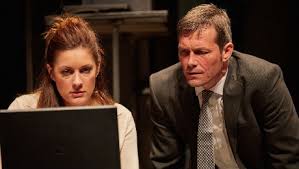
However, that said I have to mention Gemma Stroyan who played Bella Moy and Gemma Atkins who played Sophie Harington.
Stroyan gave us a confident portrayal of a female police officer which was seamlessly believable at every level, comfortable in her skin and confident in what she was about. I would like to think that maybe James would take her character in the future and promote her to the central character in her own novel(s).
Atkins also gave a polished performance as Harington keeping us guessing about who she really was and what (if anything) she was really up to.
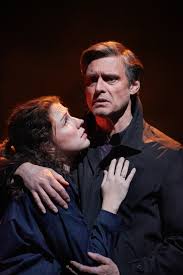
During the interval the auditorium was alive with chatter and theatre goers were talking not only amongst themselves and also with neighbouring audience members as to what they thought was going on, who had done what and making predictions about how it was all going to conclude.
Like DS Grace, I wanted to believe the main suspect, but how could we?! What was the evidence showing us? Who was safe? Who was next? WHAT WAS GOING ON?!
It would be wrong for me to tell you more but be aware it is not over till it’s over and even then not all the questions will have answers.
At curtain call the volume of the applause was only just that above the whistles of approval. This is an unmissable crime thriller that will keep you on the edge of your seat and wanting more all the way until the end.
I for one will be looking more closely at James’ novels and perhaps it will be my summer reading for 2017.
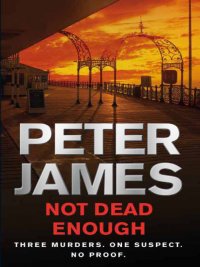
And for the record, on the way out people were still chatting and animated about what they had just seen.
NOT DEAD ENOUGH plays at Cardiff’s New Theatre from;
Tuesday 13 June – Saturday 17 June at 7.30pm
On Wednesday, Thursday and Saturday there are performances at 2.30pm.
For further details about the show or to book tickets call the Box Office on 02920878889.
‘Here We Go Again’ Emily Garside on the Dirty Protest Election Night Special

I first encountered Dirty Protest about 9 years ago, after just moving back to Cardiff. I wasn’t aware at the time they were just starting out (stay tuned for some brilliant 10th Birthday events later this year!) But I did know they provided what I thought I wouldn’t see in Cardiff- and frankly what there wasn’t a lot of in Cardiff then- new writing, non-traditional work and most importantly a welcoming attitude. As an audience member, one who was apprehensive about a theatre scene in Cardiff that always seemed a bit ‘not for me’ they were a breath of fresh air. Almost 9 years later, I’m pleased to say that as a writer they are just as welcoming and still just as much fun to be around.
It’s fair to say Dirty Protest didn’t plan on having a June new writing night, but when like the rest of us, they were surprised by the announcement we were having an election, well the opportunity was too good to miss. Dirty Protest were having an election night special.
I heard about this through being invited by co-founder Matthew Bulgo to write a short piece. Having thought about it for about 30 seconds I accepted. As ever, there was a theme to respond to, this time ‘Here we go again’. The added guidance being to listen to this wonder from Dolly Parton.
Fuelled by in part by Parton, in part by election energy (or fatigue) we were set loose. With less than three weeks to pull together a piece, it was certainly writing under pressure. But , writing creatively to a deadline is a really great exercise for any writer. Writing to a theme also, forces you out of your comfort zone, and instead of being restrictive forces a more creative approach.
My response to the brief (and Dolly!) was to take the idea of election night, and the sense of ‘repetition’ that ‘here we go again’ implies and visit two election nights- one in 1987 and the one we were about to experience in 2017. Using two people talking in a bar meeting for the first time that night, with different views on politics seemed an effective way to take on the theme. With a little twist in a link between the two pairs, and a hint of romance (because even on election night there might be romance). No writer ever really feels ‘finished’ with a piece, and despite working on it amid a ‘day job’ and various other competing deadlines, I was pleased with what I eventually sent off.
With us writers only having a matter of weeks to put it together, the assigned directing and acting teams had only a matter of hours to make what we put down into something performance ready. With a team of 8 actors sharing the scripts between them, it’s a great achievement that they pull of such great work in so short a time.
The night of the election arrived, and I can’t speak for the rest of the audience but the chance to escape endless news coverage for a couple of hours was more than a welcome distraction. Dirty Protest have always performed in non-traditional theatre spaces, and this time had taken over Outpost a combination Emporium and Coffee shop in the heart of Womamby Street. These non-theatre venues are great for audiences and creatives- it makes for a welcoming space for those who don’t usually attend theatre (and usually plenty of alcohol available too) and for the creatives, the more relaxed space takes the pressure off a bit, feeling a bit more informal (and the alcohol availability helps there too).
The great part of Dirty Protest and their approach to giving a brief and letting writers run with it, is the variety of topics it always returns. Even with the dual ‘election’ and ‘here we go again’ theme, there were such a variety of pieces offered it makes for an entertaining and fascinating evening.
This time around there was the hilarious opener from Sam Bees in which man and woman (from Mars and Venus respectively) seek to repopulate the earth. Equally hilarious was Kieron Self delivering the opening to the second act with Katherine Chandler’s Whose Line is it Anyway? Which saw him as an ill-fated comic sent to entertain Wales on election night. Another more direct take on the election was seen in Trust by Dick Johns while Nicola Reynolds used the election to make serious points about the wider issues created by past governments in Hannah. Relationships took centre stage in Kelly Jones’ sweet karaoke driven ‘Here We Go Again’ and Jafar Iqbal’s more serious piece ‘Oscar and Me’ while Kit Lambart combined relationship based comedy and political reference in ‘Here we Go Again’. The range and style of the pieces proving just how broad a response a simple brief can create. And as a writer, being among such broadly different pieces, from different styles really helps as instead of feeling competitive you end up feeling inspired by the other work drawn from the same source.
The audiences who come to Dirty Protest nights really make the experience, and having a supportive crowd ready to laugh, concentrate and even join in when called upon (thanks to Katherine Chandler and Kieron Self) is a great indicator of the kind of audience they have built up over 9 years.
As a writer, I had a brilliantly supported, creative experience writing for Dirty Protest’s election night special. As an audience member, I had yet another hilarious and fascinating evening of theatre. And I didn’t have to think about election results for a few hours on a very strange night.


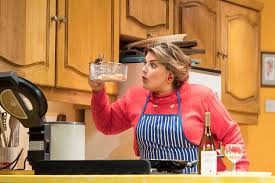
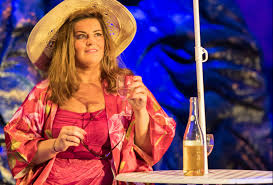
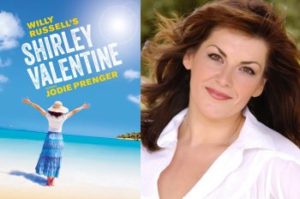

 (4 / 5)
(4 / 5)